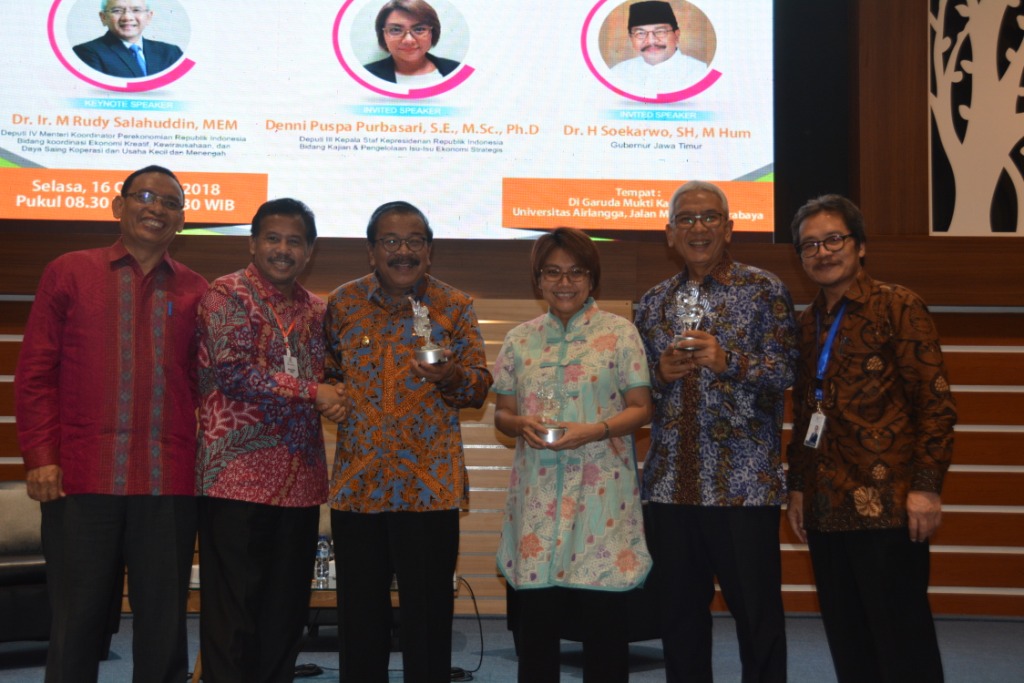UNAIR NEWS – To respond to global changes, the Indonesian Vocational Higher Education Forum (FPTVI) held an annual congress. This time Universitas Airlangga hosted the 5th Congress themed “Indonesian Vocational Higher Education Facing Industrial Revolution 4.0”.
The forum presented three main speakers, Dr. H. Soekarwo, SH, MH, as Governor of East Java, Dr. Ir. Mohammad Rudy Salahuddin, MEM., as Deputy IV Coordinating Ministry for Economic Affairs of the Republic of Indonesia, and Denni Puspa Purbasari, SE, M.Sc., Ph.D., as Deputy III of Presidential Staff of Republic of Indonesia.
As the main speaker, Governor of East Java known better as Pakde Karwo, delivered various things concerning the dynamics of vocational education in East Java. According to him, the low population growth rate in East Java indicates a higher value of work production. Soekarwo also said the importance of mapping the number of workers from vocational education in East Java to determine strategies for vocational education. Regarding the demographic bonuses, Pakde Karwo said that the use of the population in productive age must be prepared faster.
“From the right policies, employment conditions in East Java has changed with the increasing number of workers coming from vocational education,” he explained.
Furthermore, policies for the development of competitive human resources and vocational education optimization at vocational high school have been started since 2015. It was realized in the Dual Track Strategy policy with non-formal education through the Mini SKM, Vocational Training Centers and Islamic School.
However, added Soekarwo, this was not enough if health problems were not resolved. For this reason, the handling of health and nutrition continues to be dealt with because the quality of health also determines the quality of our education. Regarding the Dual Track Strategy for Educational Development, an example was given; Non-Formal Education of MINI Vocational Schools is cooperated with Germany and the development of international standard BLK.
“In Formal Education, Dual Track Strategy runs between Vocational Schools with Industry, Vocational Schools with state universities, Vocational Schools with overseas partners, 1 Referral Vocational School with 5 Private Vocational Schools, and Extra Curricular at Islamic High School (MA),” he said.
While the Double Track policy in SMA and MA Curricular activities, students are equipped with skills such as Multimedia, Electrical Engineering, Light Vehicle Engineering, Electrical Engineering, Culinary, Fashion, and Beauty Art.
From the policies that have been presented by Pakde Karwo, Vice Dean 1 of Faculty of Vocational Studies Universitas Airlangga and Head of the Similar Program Commission FPTVI Prof. Dr. Retna Apsari, M.Si (UNAIR), said that in the forum was the effort by FPTVI to work together so vocational education at universities, high schools and academics (UNISTA) could produce skilled graduates in industry and society.
“According to Law 12 of 2012 article 16, vocational education is a Higher Education diploma program (Diploma 3 or Diploma 4 / Applied Bachelor) which prepares students for jobs with certain applied skills until applied degree programs,” he explained.
After the presentation, the agenda was continued with the launching and dissemination of “Indonesian Applied Science Expert Association and Lecturers (A2DITI)”, an activity forum for Vocational lecturers, FPTVI members and the Business and Industry World (DUDI) practitioners. It was followed with the agenda of court session for each field and continued with the Plenary Session.
Author: Nuri Hermawan





